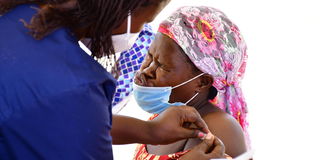Prime
Why economic recovery hinges on vaccination

A woman receives the first injection of the Covid-19 vaccine in Kampala recently. PHOTO/ABUBAKER LUBOWA
What you need to know:
Target. The country needs to vaccinate five million people as quickly as possible but there are limiting factors slowing the process.
Worldwide, Covid-19 vaccines have saved more lives than almost anything apart from clean water.
However, in Uganda, the low uptake of the Covid-19 vaccine coupled with access challenges is standing in the way of economic growth, projected to grow at between 3.5 per cent and 4.5 per cent, according to the Ministry of Finance and the Bank of Uganda assessment
To realise the anticipated growth, which had dipped to between 1.9 and 3 per cent from an average of 5.5 per cent annual growth, following the Covid-19 outbreak and the resultant containment measures whose devastating effects on livelihood and businesses resulted in the economy’s general slowdown.
As the economy was recovering after one and half years of limited economic activities, another lockdown of 42 days was imposed by President Museveni to curb the spread of the second wave of the pandemic.
According to a study by the Economic Policy Research Centre (EPRC), titled: ‘The plight of Micro Small and Medium Enterprises amidst Covid-19: A post lockdown analysis based on business climate survey’, the emergence of the pandemic and the subsequent measures to contain its spread negatively affected business operations in all sectors of the economy, albeit with different magnitude.

People wait for Covid-19 jabs at Kololo Independence Grounds in May. At least 1 million people of the targeted 21.9 million have received the Covid-19 jab, according to data by Ministry of Health.
PHOTO/ABUBAKER LUBOWA
The survey showed that businesses faced severe liquidity constraints, access to credit remains a challenge as financial institutions remain pessimistic about the future business environment.
Further, employment recovery remains sluggish as business sales have not recovered. Results suggest that the recovery of employment is much slower in Micro, Small, and Medium Enterprises (MSME) in the services sector than in agriculture and manufacturing.
Although this shouldn’t underplay the challenges, agriculture and manufacturing sectors are grappling with, which is quite immense, rather this is to demonstrate the severity of the pandemic’s impact on the service sector, which is the country’s largest economic sector.
According to researchers at EPRC and policy analysts, the population uptake of the vaccine against coronavirus will be critical in economic recovery and growth, especially should the required 80 per cent threshold be attained.
Tough job
This is, however, no mean feat, considering the hesitancy and skepticism towards the inoculation from some quarters hasn’t gone away yet. This has further been complicated by lack of effective access to the vaccines, although lately, the population desire for vaccination seems to have gone a notch higher, thanks to the ferocious second Covid-19 wave the country is dealing with.
Recently, it was revealed that only about 5 per cent of the targeted 22 million Ugandans have been vaccinated with mainly AstraZeneca since the initiation of the nationwide mass vaccination that started about four and half months ago.

Some of the closed arcades in Kampala. This is one of the measures President Museveni put in place to limit the spread of Covid-19 during this second lockdown.
PHOTO/ABUBAKER LUBOWA
Last week Daily Monitor reported that the government has cumulatively set aside Shs41b to buy Covid-19 vaccines, which are being sourced from different countries, including the United States, United Kingdom, Cuba, Russia, and China. This will be in addition to sourcing the vaccines through Covax, a facility set up by the World Health Organisation to ensure that poorer countries can access the life-saving jabs.
Until the aforementioned efforts become a reality, and the majority of Ugandans, including the vulnerable groups, get the jab, the anticipated economic growth could remain just an assessment on paper rather than a reality to look towards, a fact the government is very much alive too.
In one of his addresses to the nation, President Museveni said until the critical mass of the vulnerable population, particularly those with underlying conditions, estimated at five million, including members of the security agencies, health workers, and senior citizens are vaccinated, it will be foolhardy to revert to normal life which involves total opening up the economy.
The Director of Trade Information at Uganda Export Promotion Board (UEPB), Mr Lawrence Micheal Oketcho, says ultimately vaccination will be a defining factor.
“There is no way we can control the pandemic without a vaccine. And if we don’t have the disease under control then eventually it will affect production and productivity and this will have an impact on our exports,” he says.
It should be noted that even amidst the Covid-19 restrictive environment, the country’s exports didn’t plunge as much as earlier feared. This is attributed to the good weather conditions that naturally facilitated the production of agricultural produces and sustained marketing promotion by UEPB.
UEPB believes that mass vaccination is one of the solutions for the economy to recover during this pandemic.
“I must admit that even though we still managed to do fairly well in terms of the value we have accrued from our exports, we cannot underplay the impact of Covid-19. This is because without it we could have easily broken records,” Mr Oketcho says.
“We need to have our population vaccinated because that is one sure way to control the disease. And once we can do that, then our people can focus again on production for export across the economic sectors.” he adds.
The country’s exports for the just-ended financial year exceeds the values recorded in the previous financial year 2019/2020 by nearly a billion dollar (about Shs3.5trillion).
Before the pandemic, total merchandise export amounted to $3.7b (about Shs13.2trillion). And in the last 11 months of 2020/2021 total merchandise export had risen to $4.7b (about Shs17 trillion), despite the pandemic restrictive environment.
Uganda Investment Authority (UIA), the country’s investment prefect, with or without vaccination, has a mandate which they must deliver on.
“UIA mandate is to increase FDI in the creation of jobs but also increase domestic investment. Previous to Covid-19, we were able to bring on average 20 inward missions from FDI markets such as Europe and Asia where projects and Joint Venture contracts would be generated,” Dr Paul Kyalimpa, the deputy director general says in an email to this reporter.
He continued: “Despite Covid-19, we have continued to do this by attracting the private sector and the diaspora online to take advantage of the ease of doing business environment that includes services of online one-stop-shop centre. Our investment missions targeted at 300 firms expected to attract 10 Investments licensed worth $500M and creating 40,000 new jobs.”
Get used to it
For the Makerere University School of Economics lecturer, Dr Fred Muhumuza, it is about time the country finds a way to live with the pandemic.
He is of the view that Covid-19 is not going away anytime soon and so we don’t have to surrender to it in despair.
“I don’t like it when people say there is a new wave! We all knew these waves will keep coming. All we need to do is a plan for it because Covid-19 is going to be around for some time.
“We should be managing its spikes and accept that in the next three to four years it will be disrupting economic activities,” he says.
And as a result, It will affect revenue collection which as of just ended financial year is short by about Shs2trillion which is about twice the budget allocated to Uganda Development Bank to lend out to businesses struggling as a result of COVID-19 pandemic and the subsequent containment measures.
The Director of Research and Policy at the Bank of Uganda, Dr Adam Mugume,says it emerged that some key government projects will either be shelved or delayed as a result of budget cuts to fund the Covid-19 vaccine and help the most vulnerable people in the community being affected by the lockdown measure.
The other risk is to borrow to address these concerns, which inevitably will worsen the public debt threshold whose mark is now hovering at 55 per cent, way above the 50 per cent cap.

In May government transferred $11m (Shs38.7b) to United Nations Children’s Fund for procurement of vaccines through COVAX under the cost sharing arrangement.
PHOTO/ABUBAKER LUBOWA
VACCINATION STATUS
At least 1 million people of the targeted 21.9 million have received the Covid-19 jab leaving out 20.8 million people, according to data by Ministry of Health. As of July 6, a total of 158,733 people had received both the first and second dose while 868,303 had received the first dose.
Mr Amos Lugoloobi, the State Minister for Finance, while reading the 2021/2022 Budget on June 10, said: “The initial target is to vaccinate at least 6 million most vulnerable persons comprised of teachers, health workers, the elderly and persons with chronic ailments. Shs560b has been provided for the procurement of vaccines. Uganda’s attempt to inoculate 21.9 million of its citizens against the pandemic, which has now killed more than 2,000 people countrywide, has staggered given the global shortage of Covid-19 vaccines.
Although government had placed an order of 18 million doses of AstraZeneca vaccine, this hit a snag after India suspended exportation of vaccines following a surge in Covid-19 cases in their country. According to Ministry of Health, a total of 585,600 doses of vaccines are expected this month. Of these 285,600 doses of Oxford-AstraZeneca are expected under dose-sharing arrangement through Covax facility and a donation of 300,000 doses of Sinovac by the Chinese government. Government is also excepting 688,800 doses of AstraZeneca next month from Covax facility.
Government has also concluded a deal to procure two million Covid-19 vaccines from American pharmaceutical company, Johnson & Johnson, through the African Union and legal requirement of procurement of 9 million doses through Covax.
GROWTH
Because of vaccination, the United States, China and Europe are projected to grow at 4.5%, 8% and 4.5% respectively. According to the IMF,
Sub-Saharan Africa is in the grips of a third wave of Covid-19 infections that threatens to be even more brutal than the two that came before.
This is yet more evidence of a dangerous divergence in the global economy.





